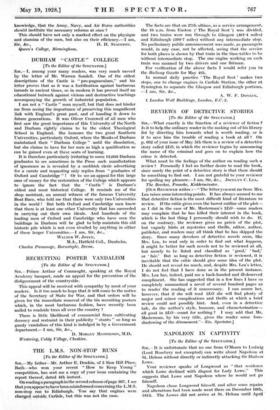REVIEWS OF DETECTIVE STORIES - [To the.Edilor of the SPECTATOR.]
SIR,—What exactly is the function of a reviewer of fiction ? Is it to help the ordinary reader in the making out of his library list by directing him towards what is worth reading, or is it to save him the trouble of reading a book at all ? On p. 692 of your issue of May 5th there is a review of a detective story called 2I1), in which the reviewer begins by announcing the name of the criminal and goes on to explain how the crime is detected.
What must be the feelings of the author on reading such a review ? Personally I feel no further desire to read the book, since surely the point of a detective story is that there should be something to find out. I am not grateful to your reviewer for spoiling my pleasure.—I am, Sir, &c., JOCELYN C. LEA.
The Beeches; Franche, Kidderminster.
[OUR REVIEWER writes :—" The letter you sent me from Mrs. Lea raises some interesting points. It has always seemed to me that detective fiction is the most difficult kind of literature to review. If the critic gives even the barest outline of the plot—. as I did in the case of Mr. Masterman's 2L0—some readers may complain that he has killed their interest in the book, which is the last thing I personally should wish to do. If, on the contrary, the reviewer gives no precis of the plot, but vaguely hints at mysteries and thrills, editor, author, publisher, and readers may all think that he has skipped the story. Since many devotees of detective novels seem, like Mrs. Lea, to read only in order to fmd out what happens, it might be better for such novels not to be reviewed at all, but merely to be listed and classified as ' good," bad,' or ' fair.' But so long as detective fiction is reviewed, it is inevitable that the critic should give some idea of the plot.' He should not reveal too much, and, despite Mrs. Lea's letter,' I do not feel that I have done so in the present instance. Mrs. Lea has, indeed, paid me a back-handed and ill-deserved compliment. She has suggested that in a few lines I have so completely summarized a novel of several hundred pages as to render the reading of it unnecessary. I can assure her, however, that if she will read 2L0 she will find plenty of major and minor complications and thrills at which a brief review could not possibly hint. And, even in a detective tale, do the author's style, humour, and characterization— all good in 2L0—count for nothing ? I may add that Mr. Masterman, by his very title, gives the reader some fore- shadowing of the dinouement."—ED. Spectator.]


































 Previous page
Previous page